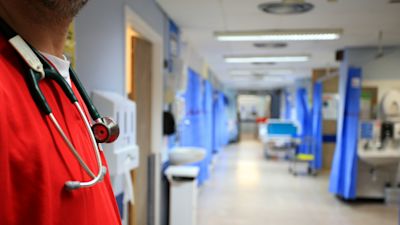'Autumn wave' sparks highest rate of Covid hospital admissions in England since August

Hospital patients testing positive with Covid in England have reached their highest level since August, thanks to a new "autumn wave" of the virus, according to the latest NHS data.
A total of 7,024 people with Covid were in hospital as of 8am on September 28, according to NHS England.
The number is up 37% from 5,142 a week earlier and the highest figure since August 19.
Patient levels topped 14,000 during mid-July - at the peak of the wave of infections caused by the Omicron BA.4 and BA.5 subvariants of the virus - after which they started to fall steadily.
But this decline came to a halt in mid-September.
The latest hospital figures - which are released once a week - show all regions are recording a rise in patients, with south-west England back to levels last seen at the end of July.
However, numbers remain well below those reached during the early waves of the pandemic.
Meanwhile, the rate of Covid hospital admissions is also increasing, with 7.6 admissions per 100,000 people in the week to September 25 - up from five the previous week. Rates are highest among people aged 85 and over, at 82 per 100,000.
Figures show the number is up sharply from 49.4 and is the highest rate for this age group since mid-August.
Around six in 10 patients who test positive for Covid are being treated primarily for something else.
Once a patient returns a positive test they need to be isolated from others who do not have Covid, putting extra pressure on hospital staff already struggling to clear a record backlog of treatment.
Professor Tim Spector, co-founder of the Zoe Health Study, said: “It’s clear we’re now seeing an autumn wave of Covid-19, combined with increases in hospital admissions.
Want a quick and expert briefing on the biggest news stories? Listen to our latest podcasts to find out What You Need To Know
“With rates on the rise, especially in the vulnerable elderly age groups, the impact on hospitalisations could be higher.
“However, the youngest age group are showing possible early signs of case numbers slowing. Children tend to be a leader of infection trends, so if this continues next week it is possible that the Covid wave might not be as bad as previously predicted.”
Figures published last week by the Office for National Statistics (ONS) showed that Covid infections in England had increased for the first time since July.
Some 766,500 people in private households were estimated to have tested positive for Covid in the week to September 14, or around one in 70 - up from 705,800, or one in 75, for the previous week.
Elsewhere, more than a quarter (28%) of over-80s in England have now received an autumn booster dose of Covid vaccine, along with a similar proportion (28.3%) of 75 to 79-year-olds, according to the UK Health Security Agency (UKHSA).
All people aged 65 and over are eligible for the booster, providing they had their last jab at least three months ago.
Doses are also available to frontline health and care workers, pregnant women and people with weakened immune systems.